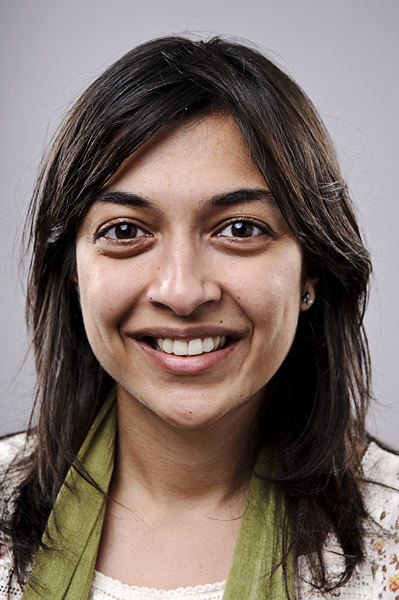Imagine this. It is an ordinary day at work. The deadlines are looming, but you head to Facebook instead. But this time, you are not mindlessly scrolling through puppy photos and Met Gala memes. A friend has just called to tell you that your photo has appeared in a massive advert in a Canadian newspaper encouraging immigration to the country. And your Facebook wall is filled with friends having discovered it too, tagging to ask if it’s really you.
You do a reverse Google search of the said photo and suddenly discover that its reach is not limited to a lone newspaper in a far-off country. Your photo is selling fairness creams in Turkey, carpets in New York, McDonald’s burgers in China, travel packages in Cambodia, and even promoting immigration to Uruguay and Canada.
Videos by VICE
You are, for all practical purposes, famous. The only catch? You did not sign up for any of this.
When Shubnum Khan, a 32-year-old writer and illustrator living in Durban, South Africa, found out about the Canadian advert in 2012, she had no idea that millions of people had potentially seen her face around the world – without her even knowing. She has documented this experience along with some other anecdotes from her life in a newly released book titled: How I Accidentally Became a Global Stock Photo: And Other Strange and Wonderful Stories (Pan Macmillan India).
“I have always been a very anxious person in general,” Khan told VICE. “When I found out about the extent to which my photos were used globally, I was nervous to even confront the photographer.”
During her university days in Durban, Khan and her friends had signed up for an unpaid photoshoot pitched as an art project titled “100 Real Faces Project” that they had discovered on Facebook. She looked up the photographer behind it and discovered that the Cape Town professional had a veritable body of work. A chance of being shot by an expert like him lured her to sign up. “What could possibly go wrong?” she remembered thinking.
“Before the shoot, they made us sign a form which seemed innocent enough,” Khan said. “No one during or before the shoot ever mentioned that our pictures would be used as stock. I was simply asked to pose for three quick headshots – happy face, straight face, and a ‘crazy’ face.”

Two years later, Khan discovered the Canadian advert. A week from then, she and her friends put up a Facebook post on this discovery, tagging the photographer. He replied, pointing out that they had agreed to the terms and conditions of the shoot, which, like most forms we sign without too much thought, had details encased in vague language and fine print.
Khan’s 2018 Twitter post, detailing the incident and her shock on finding out how her face had launched dozens of brands, went viral. It was even retweeted by Monica Lewinsky who called it “a fascinating thread on stealing identities through manipulation.” Dozens of interviews with the media later, she was dubbed by friends as the “the most interesting girl in the world.”
“And yet, there was nothing in it for me,” Khan said. “I wasn’t paid a penny by the photographer for the shoot, and nothing came out of the many interviews apart from sheer exhaustion. Many people commented saying I was doing it for publicity and money. But what was I going to do with all this publicity? The harm was already done.”
However, a few months into the fiasco, Khan realised that hers was not a one-off case. The problem was not just that one photographer who had sketchy professional ethics.

“It initially just seemed ridiculous. I didn’t take it too seriously,” explained Khan. “But my pictures were digitally altered for skin pigmentation adverts, and I was apparently giving testimonials for sensitive pregnancy and maternity-related products which I’d of course never used. It was then that other brown girls, similarly affected, approached me, and I realised that white photographers globally have taken advantage of brown women since forever this way.”
Khan’s family was understanding of her situation. It was all things bizarre, and she credits her parents for handling it well. But on a personal level, her overall reaction was that of sheer disbelief.
“If I had to be sane, it was important for me to believe that this couldn’t be happening to me,” she said. “It was too surreal for me to visualise my face on a McDonald’s joint in China or a woman looking for her ‘knight in shining armour’ on a French dating website in Morocco. I became ‘Bonny Seg’ who led treks through Cambodia, and ‘Kelsie’ from Arizona who promoted family villas. The list was endless. But then I simply dissociated myself from that image, and from all those characters. Perhaps, if I had actually visited those countries, the impact on me would’ve been on a completely different scale.”
In many ways, Khan believes that penning this story now is simply an act of “reclaiming that space” that has so far been denied to her.
“Everything about my own out-of-control story had further gone out of my control,” said Khan. “I had a different name and story in each of those adverts. But the real Shubnum is someone else entirely, and this is my way of finally taking charge of my story in my own words.”
Follow Arman Khan on Instagram.
More
From VICE
-

Marilyn, an attorney and former professional dominatrix, poses for a photo with her sub who is fully encased in latex on the Vancouver Fetish Cruise. Photo by Paige Taylor White. -

-


